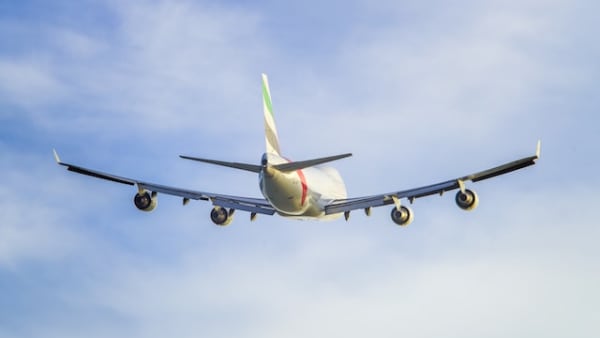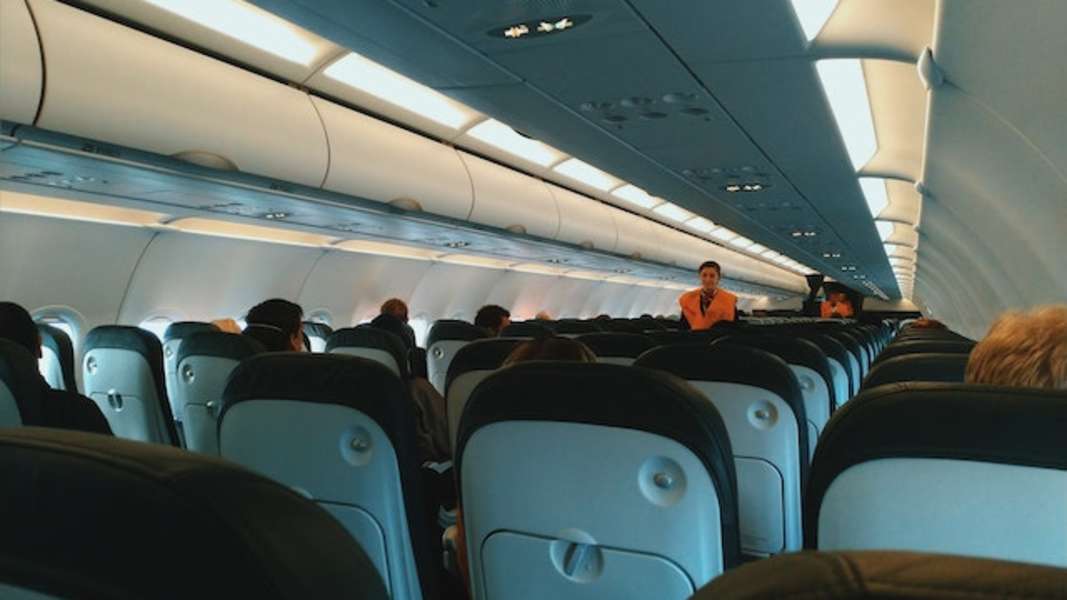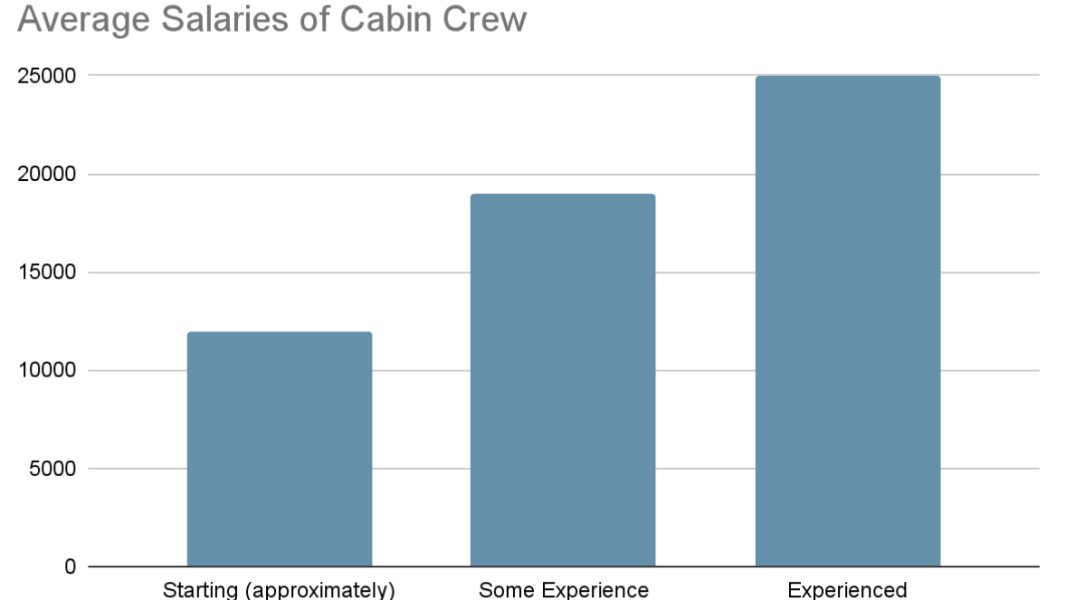What is a cabin crew member?
A cabin crew member, also known as a flight attendant, is a trained professional responsible for ensuring passengers' safety, comfort, and well-being aboard an aircraft.
Cabin crew members can work on various flights, including commercial airlines and privately chartered aircraft.
The primary role is to assist and serve passengers during flights, but they also play a crucial role in maintaining the overall safety and security of the aircraft.
Key responsibilities
The key responsibilities of a cabin crew member are centered on the safety and care of the passengers onboard as well as their comfort when on board the airline.
Pre-flight preparations: Cabin crew members perform pre-flight checks to ensure the cabin is clean, well-stocked with supplies, and equipped with safety equipment. They also check that emergency equipment is in place onboard the aircraft ensuring all necessary supplies are available.
Passenger assistance: Cabin crew members welcome passengers on board, assist with finding their seats, and help stow carry-on luggage. They provide safety demonstrations, explain emergency procedures, and ensure passengers know the aircraft's layout and safety features.
Provide In-flight service: Cabin crew members offer food, beverages, and other amenities during the flight. They serve meals, snacks, and drinks. They must also deal with passenger requests, provide assistance, and address any concerns or issues that may arise during the flight.
Safety and security: Cabin crew members are responsible for maintaining a safe and secure cabin environment. They assist during emergencies such as turbulence, medical emergencies, or evacuations. They must also administer first aid and CPR should the need arise and coordinate with the flight deck crew to handle emergencies effectively.
Update passengers: Cabin crew members serve as the primary point of contact between passengers and the flight deck crew. They communicate important information, such as turbulence warnings, weather updates, and flight announcements. They also communicate with ground staff, providing updates on passenger counts, special requirements, and other relevant information.
Skills and qualifications needed
Individuals interested in training to become cabin crew must have attained a grade C or above in Maths and English at GCSE level or equivalent.
Candidates who have attained a vocational qualification, for example, NVQs awarded by educational providers City & Guilds or Pearson in a related field, are also eligible to apply for cabin crew opportunities.
All cabin crew members undergo rigorous training that covers safety procedures, emergency protocols, customer service, and first aid before they are permitted to take up a role as cabin crew.
Additional skills needed for any successful cabin crew member include:
- Excellent communication and interpersonal skills
- Be physically fit
- Flexible in dealing with irregular working hours, long flights, and varying time zones.
- Ability to work under pressure
- Be flexible and adaptable
- Have strong numeracy skills and the ability to deal with cash transactions confidently
It is worth noting that higher level education, such as a degree or post-graduate qualification, isn’t necessary to be eligible to apply for cabin crew opportunities.
While those who have studied an additional qualification in a related field have shown commitment and interest, airlines do not require this.
Working hours
The working hours of cabin crew vary according to the airline and type of flight (domestic or international).
No matter the length of the flight, cabin crew working hours are often irregular, with cabin crew working unsociable hours. The demands of the role include early morning starts as well as working later nights along with weekend work or bank holidays such as Christmas Day and New Year's Day. Working hours can also be affected by flight delays.
A rota shift system generally determines working hours. This means that cabin crew may occasionally have to work on their days off should cover be needed.
Some cabin crew members work on a part-time hours contract. These contracts often include unsociable hours due to the nature of the role.
What to expect
The role of a cabin crew and what to expect can vary depending on the airline.
In general, cabin crew must live within a designated radius of their home airport base. All cabin crew must be flexible, as they may be called in to cover a flight at short notice. Living within easy traveling distance of the airport enables them to report for a flight quickly should the need arise.
The nature of the role requires exceptional customer service at all times. Cabin crew are always expected to be polite, firm, and friendly, even when dealing with challenging passengers.
All airlines expect cabin crew to abide by their dress code. This includes dressing in the required cabin crew uniform and ensuring they are always well-presented.
Pros and cons of being a cabin crew member
The pros of being a cabin crew member make it a rewarding and fulfilling career choice for many.
Travel Opportunities: One of the biggest perks of being a cabin crew member is the chance to travel to various destinations worldwide. You get to explore different cities, experience other cultures, and visit places you might not have had the opportunity to see otherwise. This can be an enriching and exciting aspect of the job.
Meeting New People: As a cabin crew member, you interact with passengers from diverse backgrounds daily. This allows you to meet new people worldwide, learn about different cultures and develop interpersonal skills.
Job Stability: While the aviation industry was affected by the pandemic, with the sector's recovery, many airlines are actively recruiting. This stability is beneficial for those seeking a long-term career.
Transferable Skills: Working as a cabin crew member can contribute to personal growth and development. You gain valuable skills such as effective communication, problem-solving, teamwork, and adaptability. These skills can be transferable to various other professions should you decide to move on from a cabin crew role.
Dynamic Work Environment: The work environment for cabin crew members is often dynamic and ever-changing. You are constantly on the move, facing new challenges and dealing with different situations. This can prevent the job from becoming monotonous and offers a sense of variety many people look for in a role.
Training and Development: Airlines invest in their cabin crew members' continued training and development. Individuals receive extensive training that covers safety procedures, customer service, and emergency protocols such as first aid and CPR. This training can enhance your skills and knowledge, providing a solid foundation for a career in the aviation industry.
Discounts and Perks: Cabin crew members receive discounts on flights, accommodations, and services from their airline and partner companies. These perks mean you save money and take advantage of discounted travel opportunities during your time off.
It's important to note that while being a cabin crew member has its advantages, there are also cons to the role, such as
Irregular working hours: Cabin crew members often work on a shift basis, including early mornings, late nights, weekends, and holidays. This irregular schedule can disrupt personal routines and make maintaining a healthy work-life balance challenging.
Jet lag and fatigue: Jet lag and disrupted sleep patterns can result from frequent travel across various time zones. Cabin crew members often have to adjust to different time zones, which can cause fatigue and exhaustion.
Physical demands: The job of a cabin crew member involves physically demanding tasks such as lifting heavy luggage and standing for long periods. This can result in physical strain and may lead to health issues over time.
Health risks: Cabin crew members are more prone to respiratory infections due to close contact with passengers and continued exposure to recycled air in the aircraft.
Disrupted family life: Depending on the airline, cabin crew members may have to spend several days or weeks away from home due to extended stopovers and international flights. This can strain personal relationships and make maintaining a stable social life challenging.
Limited career progression: While there are opportunities for career progression within the cabin crew profession, the scope for advancement may be limited with some airlines.
Cabin Crew Salary
Salaries for cabin crew vary according to the airline. The chart below provides a guideline for cabin crew salaries according to the level of experience and progression in the role.
How do you become a cabin crew member?
Outlined below is an overview of how you become a cabin crew member:
Research the Role: Begin by understanding a cabin crew member's responsibilities, duties, and lifestyle. Familiarize yourself with the airline industry, the specific airline(s) you are interested in, and the job requirements.
Ensure You Meet the Basic Requirements: Most airlines have certain basic requirements that applicants must meet. These include being 18 years or over, having the necessary grades in Maths and English, and having the legal right to work in the country where the airline is based.
Physical Fitness: The job of a cabin crew member can be physically demanding. Maintain a good level of physical fitness and ensure that you meet the physical requirements specified by the airline, such as height and weight restrictions.
Apply for Vacancies: Look at airline websites, job portals, and industry forums for cabin crew openings. Follow the application process outlined by each airline.
Attend Interviews and Assessments: If your application is shortlisted, you will be invited for an interview and various assessments. These assessments can include video interviews, group exercises, role-plays, situational judgment tests, and individual interviews.
Medical and Background Checks: Successful candidates are usually required to undergo medical examinations to ensure they are fit to perform the duties of a cabin crew member. Airlines also conduct background checks to verify employment history, criminal records, and eligibility to work.
Complete Your Training: Once selected, you will undergo comprehensive training provided by the airline lasting between four to seven weeks. This training typically covers safety procedures, emergency evacuations, personal grooming, immigration regulations, cultural awareness, customer service protocols, and specific policies and guidelines of the airline. Topics are assessed through practical and written assessments.
Pass Your Probationary Period: The probationary period for cabin crew usually lasts six months. During this period, individuals are monitored and supervised in all aspects of the cabin crew role.
Start as Cabin Crew: After successfully completing the probationary period, you'll be ready to start as a cabin crew member.
Future prospects and career ladder
Those starting a career as a cabin crew can look forward to continuous training and development in their role.
For some, this can lead to progression up the career ladder to the role of a purser: an individual responsible for the overall management of a section of the cabin, for example, business class or long haul flights, economy, business, or first class sections.
Individuals wishing to progress further in a cabin crew role can move to senior cabin crew or cabin supervisor/manager. This role involves the overall management of all sections of the cabin and the management of the cabin crew on the flight. The senior cabin crew is responsible for documentation and completing necessary paperwork after each flight. Supervising and training new cabin crew members is also vital to this role.
Those wishing to transfer their skills into a different part of the aviation field can move to a different role within the airline. Examples include opportunities in HR such as recruiting new cabin crew, training new cabin crew, or a passenger services-focused role.
Individuals may also wish to join another airline or take up a role as a flight attendant on a private airline dealing as a corporate/executive airline assistant.
Useful resources
Here are some useful resources to consult if you are interested in becoming a cabin crew member.
- The International Air Transport Association (IATA) List of Airline Websites: includes information on the 300 airlines that IATA represents.
- Carerroo Top Airline Employers: a guide to the top aviation companies, including the recruitment and selection process for each
- Educational providers such as City & Guilds and Pearson for those looking to study further qualifications and gain a deeper insight into the aviation field.







